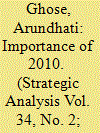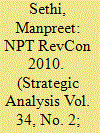|
|
|
Sort Order |
|
|
|
Items / Page
|
|
|
|
|
|
|
| Srl | Item |
| 1 |
ID:
115969


|
|
|
|
|
| Publication |
2012.
|
| Summary/Abstract |
This article deals with the plutonium production capabilities in civilian research reactors and the resulting proliferation risks. A complete record of all civilian research reactors located in Non-Nuclear Weapon States and de-facto Nuclear Weapon States is compiled and systematized according to their type. A discussion of the various production paths and scenarios for plutonium with those reactors follows. In order to derive an assessment with a broad coverage, partly diverse fleet of reactors, two designs representative of light water and heavy water moderated reactors (which account for 82 percent of the total installed capacity in Non-Nuclear Weapon States and de-facto Nuclear Weapon States) were chosen and included in burn-up calculations with the Monte Carlo code KENO V.a and Origen-S, both incorporated in the modular system Scale-6. The effective production rates in fuel elements as well as by irradiation of targets are then applied to calculate the capabilities of plutonium production of each considered research reactor. The results provide an overview of the proliferation relevance of the global research reactor fleet and its regional distribution.
|
|
|
|
|
|
|
|
|
|
|
|
|
|
|
|
| 2 |
ID:
094562


|
|
|
|
|
| Publication |
2010.
|
| Summary/Abstract |
In international relations, the more powerful have a way of underplaying history or overemphasising it, depending on how helpful or otherwise it may be in promoting their immediate objectives. It is interesting to note that even a country like India, which is beginning to sense the stirrings of power, is tending to fall into the same pattern. While this may be generally true, the expressions of power in the context of the non-proliferation of nuclear weapons, as becomes evident from an assessment of the five yearly Review Conferences of the Nuclear Non-Proliferation Treaty (NPT), have been more pronounced than perhaps in any other area of international relations.
|
|
|
|
|
|
|
|
|
|
|
|
|
|
|
|
| 3 |
ID:
094500


|
|
|
|
|
| Publication |
2010.
|
| Summary/Abstract |
Amongst the challenges that bedevil the Non-Proliferation Treaty (NPT) today, the NPT Review Conference (RevCon) 2010 will have to particularly handle two issues: one, right of non-nuclear weapon states (NNWS) under Article IV over the entire nuclear fuel cycle; two, identification by nuclear weapon states (NWS) of credible moves under Article VI for realising disarmament. In addressing the two interlinked issues, the RevCon has an opportunity to refocus the 40-year-old treaty into an effective instrument of non-proliferation and disarmament-its original twin objectives. The article also recommends the role that India can play in helping the NPT overcome its challenges. As a non-member, India has no direct stake in the treaty, but non-proliferation is an objective that furthers India's national security.
|
|
|
|
|
|
|
|
|
|
|
|
|
|
|
|
| 4 |
ID:
094499


|
|
|
|
|
| Publication |
2010.
|
| Summary/Abstract |
Despite groundbreaking disarmament pledges and substantial effort, the Obama administration's hopes for a successful Nuclear Non-Proliferation Treaty (NPT) Review Conference may not be fully realised. Many developing countries are in no mood to grant new non-proliferation concessions, such as tightened rules on access to sensitive nuclear technologies, tougher inspection rules, or limits on withdrawing from the treaty. The non-nuclear weapon states (NNWS) remain angered by the failure to move forward on many disarmament commitments pledged at the 1995 and 2000 Conferences. Moreover, progress on disarmament measures under Obama has been slower than hoped, as he faces considerable scepticism in Washington about his strategy.
|
|
|
|
|
|
|
|
|
|
|
|
|
|
|
|
| 5 |
ID:
095114


|
|
|
|
|
| Publication |
2010.
|
| Summary/Abstract |
A successful outcome of the 2010 Nuclear Non-Proliferation Treaty (NPT) Review Conference is widely seen as vital if the NPT is to continue to play an important role in preventing nuclear proliferation. Focusing on the concept of trust, this article offers a novel perspective on the treaty and its future prospects. Too often dismissed as impossible or dangerous in international politics, trust has received little attention from both academics and practitioners. This article challenges this predominant view by making a case that the NPT establishes and embodies a series of trusting relationships between states. Trusting relationships are analysed as a way in which states relate to each other, taking into account both interests as well as promises. It does not make the case that once such relationships are established they will remain constant, but rather that trusting relationships are dynamic. They can be strengthened or weakened depending on the choices of actors. The article shows how trusting relationships have underpinned the NPT from its beginning and charts their evolution by reference to three key sets of relationships. These are, first, the relationships between the recognized nuclear weapon powers and the non-nuclear weapon states; second, those among the recognized nuclear weapon states; and third, those between the NPT signatories and those states remaining outside of the treaty. For each set of relationships the problems and issues that have eroded trust are outlined and the steps that might lead to the overcoming of these strains and the strengthening of the trusting relationships are discussed. By understanding the NPT through the prism of trust, the article sheds new light on both the achievements of the treaty as well as its potential fragility. At the same time, such an analysis opens up the directions of policy crucial to strengthening the treaty at the Review Conference and beyond.
|
|
|
|
|
|
|
|
|
|
|
|
|
|
|
|
|
|
|
|
|